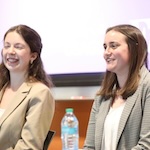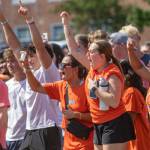
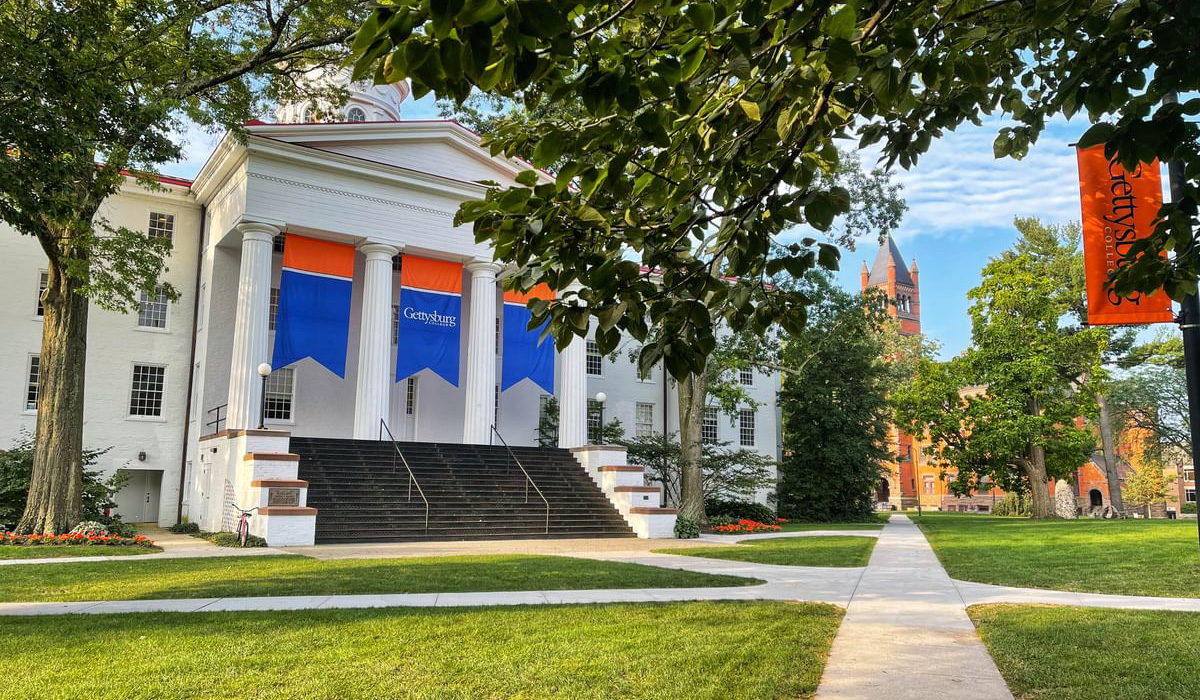
Supported by the Gettysburg Approach, the Guided Pathways connect Gettysburg College students with the breadth and depth of knowledge and enduring skills they need for a lifetime of personal and professional career success. By opting into the Guided Pathways during your first year at Gettysburg, you embark on a journey of self-discovery by making the most of experiential learning during your undergraduate liberal arts and sciences education at Gettysburg.
You’ve learned and explored what you could achieve in year one. What’s next?
In year two, the experiences you continue to participate in allow you to explore your interests, reflect on your activities, and cultivate the skills you hope to strengthen. Through the Guided Pathways, you receive ongoing one-on-one mentorship from members of your Personal Advising Team, including your faculty advisor, co-curricular advisor, career advisor, and at the conclusion of your sophomore year, an alumni mentor.
Learn more about what you can expect in your second year of the Guided Pathways.
Step 1: Reflect on year one.
During the first year of participating in the Guided Pathways, you’ll have taken advantage of experiences that have connected you with opportunities to explore your interests and develop enduring skills. You may have joined a club, participated in a service project for an on-campus student organization, or completed a Career-Ready Experience.
After participating in these activities, you’ll have submitted first-person reflections about what you learned from them, how these activities relate to your interests, and how the skills you’ve built through them can prepare you for graduate or professional school or your first job.
During the fall semester of your sophomore year at Gettysburg, you’ll meet with your co-curricular advisor to talk about what you’ve accomplished in your first year of the Guided Pathways and any activities you’ve completed during the summer. You’ll describe which experiences were most meaningful to you in your first year and think about what you’d like to do during your second year of the Guided Pathways.
“As students participate in more experiences, we will focus on their development of enduring skills and intentionally reflect on how they are enjoying various experiences and learning from them,” said Cara Smith, co-curricular advisor. “As the students in the Class of 2027 get more involved at Gettysburg, we will delve deeper and discuss which Guided Pathway they would like to pursue further, thinking about Exploratory and Consequential Experiences.” These Guided Pathways experiences enable students to engage in activities that further their focus and interests.
Step 2: Identify more opportunities.
Helping students make the most of their time on campus is what makes Gettysburg College’s Guided Pathways distinct. In your second year, you’ll continue to select and engage with intentional experiences that interest you as you pursue activities within the following thematic Guided Pathways:
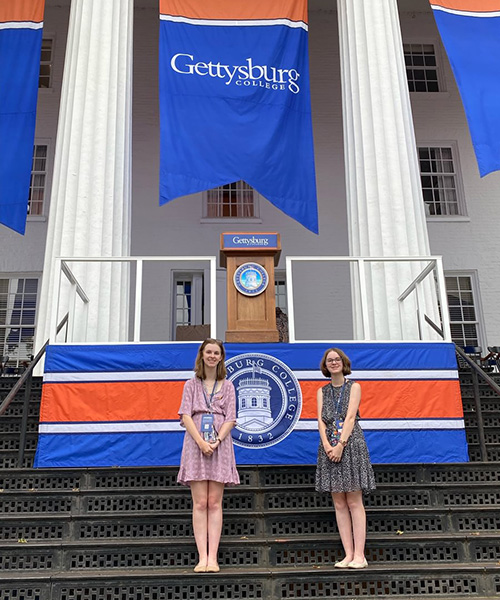
Jillian ’27 and Madison Bick ’27 of Red Lion, Pennsylvania, both decided to participate in the Guided Pathways during their first year at Gettysburg because it would help them navigate their Gettysburg education with purpose. They launched their paths by attending the Fall Activities Fair to learn about the diverse student clubs and campus organizations that interested them.
“We saw that Gettysburg has clubs that have to do with drawing, art, and theatre. We joined clubs like Artem to see if we liked them, and they started to become part of our routine,” explained Jillian, a biology major and neuroscience minor. “I’m also interested in community change, and [the Activities Fair] was a way for me to see what Gettysburg had to offer. I could attend and say, ‘Oh, look at all these service organizations that I can be part of,’ and the experiences can count toward the Guided Pathways.”
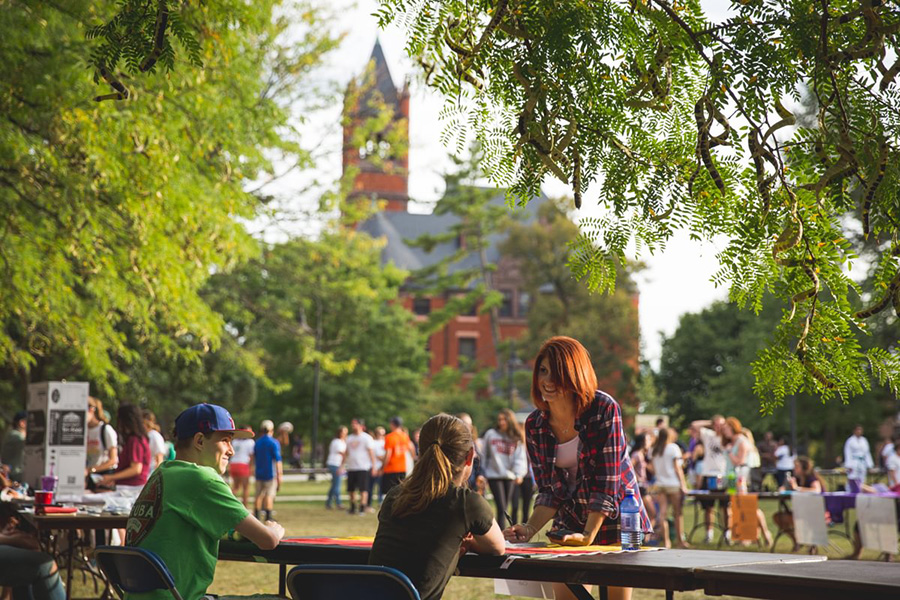
Knowing that the Guided Pathways provided a roadmap to making the most of their time at Gettysburg helped Jillian and Madison feel more confident about their first-year experiences.
One of their first activities at Gettysburg was participating in Gettysburg’s GIV (Gettysburg Is Volunteering) Day. During this annual community service day held during Orientation, students, faculty, and staff volunteer at dozens of nonprofit organizations throughout Adams County, Pennsylvania. Madison volunteered at the Pollinator Garden at the Painted Turtle Farm, while Jillian served at the South Central Community Action Program (SCCAP) Support Circles.
Exploring the Justice and Community Change Guided Pathway put Jillian and Madison in touch with El Centro, a local volunteer tutoring opportunity available through Gettysburg College’s Center for Public Service. This community service experience allowed them to mentor Gettysburg-area youth and help them build their Spanish language skills.
“For me, in the future, I would like to have a job that works with kids,” said Madison, a psychology major and neuroscience minor. “I was particularly excited about El Centro being able to engage with kids. It was a great opportunity to be part of a community of people who can come together, help the kids learn, and play with them. It’s also being able to explore cultures and understand people better.”
Jillian and Madison also referred to the Guided Pathways webpage to help them identify additional opportunities to pursue within each of the thematic Guided Pathways.
“For the Career Development Pathway, we participated in a J-Term [January Term] activity, Level Up Your Resume and Cover Letter, so that we could start updating our resumes and attending career fairs. We went to a few Global Citizenship and Intercultural Fluency experiences like the International Food Fest and the Vietnamese Lunar New Year celebration,” said Madison.
Organizing all these experiences through the Guided Pathways helped them begin to identify their areas of interest and build a portfolio of diverse experiences within the program’s themes.
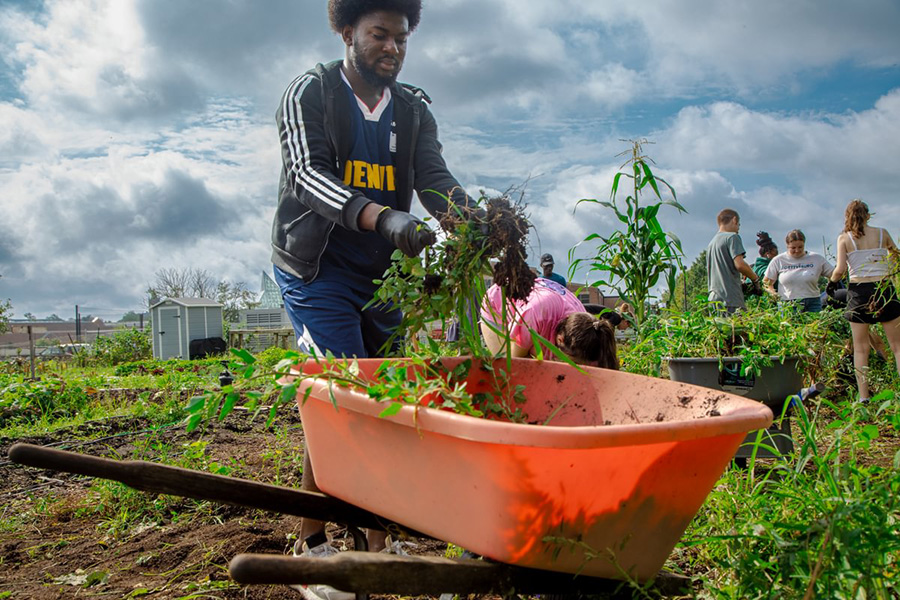
Step 3: Participate and learn.
Looking ahead to year two, Jillian and Madison envision continuing to volunteer with El Centro, which aligns with their interests in community change. They’re also considering joining the Gamma Sigma Sigma service sorority to participate in even more projects that connect with the Justice and Community Change Guided Pathway and take advantage of career-building and networking activities through Gettysburg’s Center for Career Engagement.
“We also have a lot of activities in the Creativity, Entrepreneurship, and Innovation Guided Pathway,” Jillian added, acknowledging their involvement with Artem during their first year. Becoming part of the stage crew for theatre arts performances, they said, could allow them to gain experience with and hone their skills in leadership and teamwork.
“I’m not exactly sure where I want to go with my major yet, but I know I want to help people. The service events and the Newman Association at Gettysburg are all about helping people,” Jillian said. “It’s important for me to continue to ask, ‘Who am I helping? Why am I doing this? Why am I interested in helping people?’”
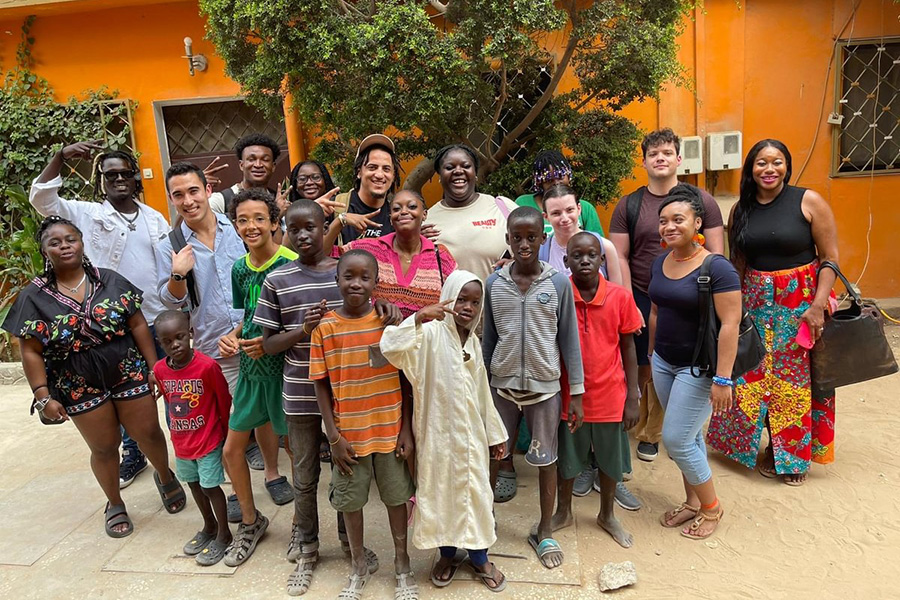
Smith said building on experiences from your first year, being open to trying new things, and developing new skills will help you go through year two.
“Participating in an experience over several years is a great opportunity to gain more expertise in that area, reflect on skill development and values, and take on leadership roles,” Smith said. “As students progress along their college journey, I encourage them to begin to consider what they would like to pursue in the future and explore activities that will help them develop the enduring skills related to those pursuits. I encourage students to participate in experiences that provide them with personal fulfillment and skill development as they think intentionally about what interests they would like to pursue after Gettysburg.”
For students who have selected a major, year two is also a great time to think about what interests them outside the classroom that might align with their major, added Assistant Vice President for Co-Curricular Education Jim Duffy. While students can explore opportunities that either align with or extend beyond their major, “year two is a good time to start exploring the connections between academic and co-curricular interests,” he said.
Remember that throughout your Guided Pathways journey, your Personal Advising Team will continue to be your source of advice and support. Your advisors are here to help you succeed—don’t be afraid to ask for help.
“It is great to have that specialized help so that you know, ‘Oh if I’m having a problem with this, I can go to this person. If I’m having a problem with that, I can go to this person.’ It is great to have this support,” Madison said.
“Having a big support system in the advisors is really helpful,” Jillian added. “If I had a question about an internship, I could ask my career advisor, ‘Can you help me,’ or ask my co-curricular advisor, ‘What could I do if I’m interested in art? Who can you connect me with?’ The advisors were a great way to show us what Gettysburg had to offer, especially if we were too nervous to go out and look for ourselves.”
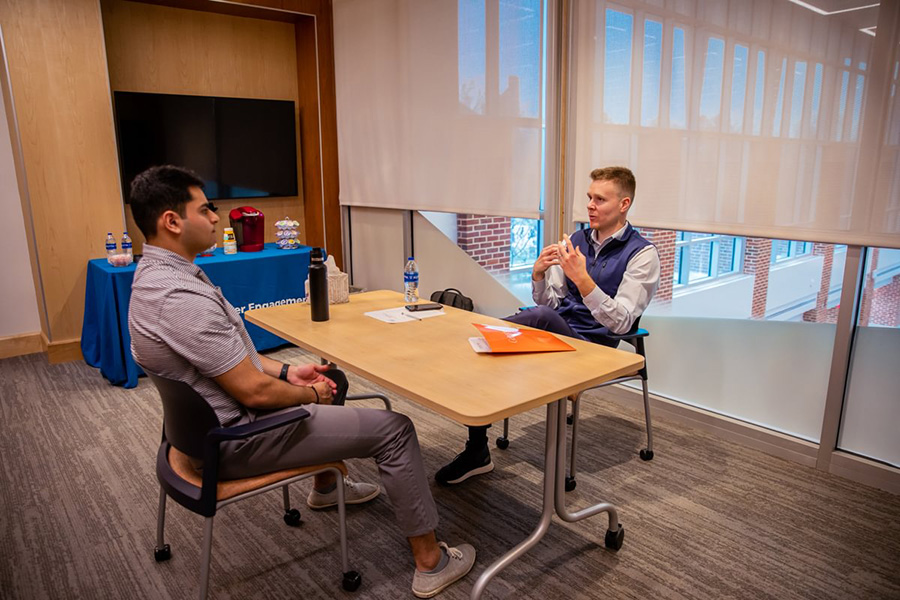
Step 4: Add an alumni mentor.
When you complete your sophomore year at Gettysburg, you’ll also gain another source of support from your Personal Advising Team. At the end of year two, you can add an alumni mentor.
Alumni mentors leverage the strength of the Gettysburg Network, with its more than 32,000 Gettysburg College alumni leading their own consequential lives. Your alumni mentor will assist you in further defining your career goals and building your professional network.
Step 5: Get ready for year three.
Your second year in the Guided Pathways will amplify your great work in your first year at Gettysburg. Through the experiences and opportunities you participate in, you’ll continue to deepen your breadth and depth of knowledge and build enduring skills through the Gettysburg Approach. At the end of year two in the Guided Pathways, you’ll be ready to select one Guided Pathway to pursue for the remainder of your consequential education at Gettysburg College.
As you reflect on your Guided Pathways experiences with your co-curricular advisor at least once per semester, you’ll gain insight into how to apply your skills and experiences to match your professional goals.
“The reflections are beneficial for the present,” Madison said. “You don’t realize until later—after an event or after you participate in a club for a whole year—you’ve learned a lot.”
“The reflections are also important for the future,” Jillian added. “When you start to look for an internship, or you’re applying to graduate school or any other future career opportunity, you can look back at this roadmap you’ve created and how you’ve grown. Maybe you’re in a job interview, and [the employer is] asking about your experiences. You’ve already reflected on them a lot.”
By Michael Vyskocil
Photos by Madison ’27 and Jillian Bick ’27, Scott Boddery, Abbey Frisco, and Khun Minn Ohn ’19
Posted: 08/05/24

